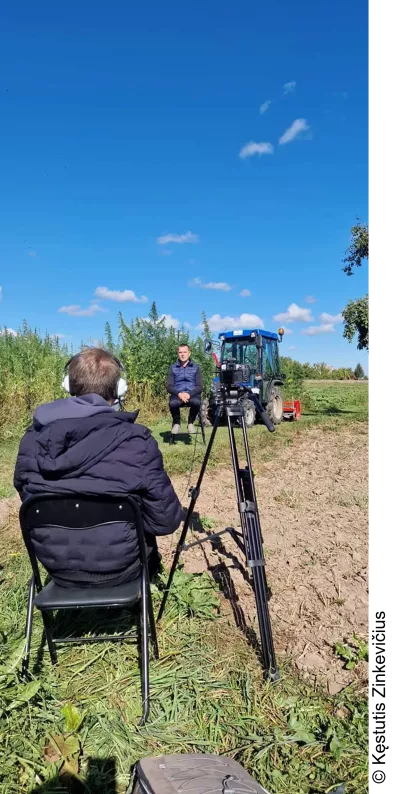General information
RDP Priority
- P6. Social inclusion and local development
RDP Focus Area
- 6B: Local development
RDP Measure
- M19: LEADER/CLLD
Summary
Farmer Kęstutis Zinkevičius started as a cereal farmer in Lithuania in 2013. However, business was slow and it was difficult for the young farmer to obtain sufficient income. When looking for a more lucrative crop, Kęstutis’ attention was drawn to a plant that was relatively unknown in Lithuania so far - fibrous hemp. When he took a closer look and discovered the benefits of the plant once processed into suitable food and health products, he found the business development opportunity he was looking for: selling organic, 100 percent natural hemp oil, hemp protein and hemp seeds.
He obtained the rights to process hemp on-farm from the state veterinary service. But before he could succeed with his new business idea, an existing farm building required repairing and the necessary equipment for processing was also needed. An application to LEADER was submitted to support this local economic development opportunity.
Results
- Increased efficiency of the farm business with good cash-flow and free of any debt or financial obligations.
- One job created and two existing jobs safeguarded.
- Increased productivity and net profitability after the implementation, exceeding project expectations.

Promoter
Farmer Kęstutis Zinkevičius
Funding
Total budget 47 647 (EUR)
EAFRD 24 547 (EUR)
National/Regional 4 332(EUR)
Private/Own funds 18 768 (EUR)
Resources
Documents
EU CAP Network - Good Practice - LEADER project helps Lithuanian farm diversify into hemp production
(PDF – 660.93 KB)
Context
Kęstutis Zinkevičius from Ukmergės in Lithuania founded his cereal farm in 2013. However, after establishing his farm and starting the cultivation of crops, income from the grain remained low, equipment was expensive and development opportunities seemed hard to come by. It was difficult for the young and small farm to compete in the market. When the farmer decided to look for a more lucrative crop, his attention was drawn to a plant that was relatively unknown in Lithuania so far - fibrous hemp. But also with this crop, there was no big profit to be made from just growing and selling the raw produce. So, the farmer took a closer look and discovered the benefits of the plant for the human body once processed into suitable food and health products such as hemp oil, hemp protein and hemp seeds. This promised to be the development opportunity he was looking for.
Soon after, Farmer Zinkevičius applied to the state veterinary service and was granted the right to carry out hemp processing activities on his farm. Before he could succeed with implementing his new business idea, an existing farm building required repairing to accommodate the processing activities, and the necessary equipment for processing was also needed. An application to LEADER was submitted to support this local economic development opportunity.
Objectives
The project had the following objectives:
- To add value to raw hemp by processing the crop into different high-quality organic products on-farm.
- To achieve economic effectiveness, profit and stability.
Activities
The project activities were:
- Refurbishment of one farm building to accommodate the processing activities.
- Purchasing the equipment and machinery necessary to ensure effective processing. This included:
- Crop drying device with a maximum load of up to 30 kg;
- Vibro separator set and innovative ultrasonic cleaning system;
- Grain cleaner, which, during primary cleaning, has a capacity of 5 tonnes/hour;
- Mini-tractor.
Main results
The project investments allowed the farmer to carry out activities directly related to product processing (oil production) and food production, during which protein is produced and hemp seeds are cleaned and marketed.
The following results were obtained:
- Increased efficiency of the farm business with good cash-flow and free of any debt or financial obligations.
- One job created and two existing jobs safeguarded.
- Increased productivity and net profitability after the implementation, exceeding project expectations.
- Increased work capacity and productivity by 5% since the project’s implementation.
Key lessons and recommendations
- A lot of new things were learned during project implementation. This included how to complete public procurement and there was also a need to learn about the legal regulations of construction.
- Adapting to changing requirements was also necessary relating to the construction project, prices, etc.
“The benefits of the project are huge but circumstances beyond our control, such as the war in Ukraine and inflation, have brought many challenges that had significant impacts because our product only has a niche market.”
Kęstutis Zinkevičius
